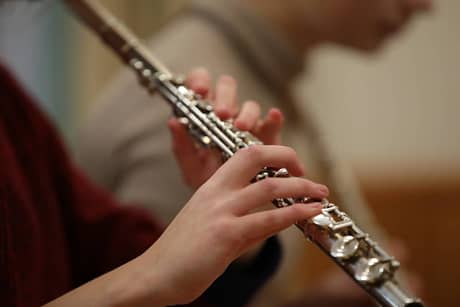 I have a confession. When I graduated from college, I aspired to work my way up from a small school program and landing in a prestigious position at a big school, with a lot of motivated students, a big budget, overly talented musicians who studied privately, and several assistant band directors who would take care of all the miscellaneous activities outside of directing music. In my mind, that dream was going to be the perfect job. It didn’t take long to realize that this school of utopia did not exist in the way I had imagined it. I quickly learned teaching in a small school had tremendous benefits and inconceivable rewards.
I have a confession. When I graduated from college, I aspired to work my way up from a small school program and landing in a prestigious position at a big school, with a lot of motivated students, a big budget, overly talented musicians who studied privately, and several assistant band directors who would take care of all the miscellaneous activities outside of directing music. In my mind, that dream was going to be the perfect job. It didn’t take long to realize that this school of utopia did not exist in the way I had imagined it. I quickly learned teaching in a small school had tremendous benefits and inconceivable rewards.
Now let’s fast forward. I recently retired from teaching in a small school after 36 years. The lessons I learned shaped my teaching career and the learning experiences I was able to provide for the students, my school district, and my community. Here are the six biggest challenges I faced and the powerful solutions that helped me find success in a small school.
Isolation When I was first hired to teach band at a small school, I was the only band director in the school district, and we did not have mentors to share our needs and concerns. As luck would have it, we had a conference meeting of band directors within the first two weeks of my new job, and I quickly made connections with every one of them. I would call them for advice, to borrow music and instruments, or simply to talk shop. Connecting with band colleagues in my area created a network that helped me and my students. I often sought out advice and ideas from fellow music educators. While mentorships exist in many schools today, I still recommend taking the time to discover fellow band directors in your area, connect with them, and develop your own professional network. This was a significant key to my longevity and success.
Culture Every school and community has its own culture and traditions. You are in a unique position to nourish a school’s or community’s culture and traditions and create exciting musical opportunities. In some cases, you might be the musical or cultural center of the community, and with that comes an important responsibility. Music selected to be studied must be chosen wisely to meet the students’ needs. Drawing upon the students’ interests and the interests of the community, a small school band director can create something special.
Scheduling Make a point of being on every annual course scheduling committee to ensure music is part of a balanced educational school offering. No one wants to be on more committees, but this committee needs your voice to ensure music is available to all students.
Instrumentation From year to year, the instrumentation would fluctuate, and there were times when parts needed to be rewritten or covered by another instrument. This is a challenge small school band directors face every year. I approached this carefully when rewriting parts or assigning different instruments to fill out voicings, and it became an opportunity to provide students with a meaningful learning experience. I would do this only if the integrity of the music was maintained and the rewritten parts enhanced the musical experience.
Parent or Caregiver/Community One of the greatest joys of teaching in a small school is the opportunity to know and connect with your students, their families, and the community. Embrace this as much as possible. In addition, attend civic and community events and get involved with community functions. Building relationships with your students, their parents or caregivers, and community members is powerful and will garner more support for your program than you can imagine.
Teacher/Administrator Unless a teacher or administrator has been part of a band, they might not fully understand the operations and procedures necessary to teach band. Develop a rapport with your colleagues in education and not only share but teach them why you do what you do. No one else will teach them the ins and outs of what is necessary to create and maintain a small school band program, so you must take the initiative.
The National Association for Music Education (NAfME) has a new endeavor called the Small School Initiative that focuses on key issues and effective strategies for networking, community-building, professional learning, advocacy, and resource development to support music educators in small schools throughout the United States. I encourage small band directors to view and participate in our surveys, town halls, and professional learning opportunities.
Teaching in a small school is special. The utopian band program I was looking for truly existed in my first small school job. Great band programs can thrive and flourish at all small schools if the right pieces are in place. I know it can be done because I have seen it throughout our country, and I have experienced it. I am proud to have been a small school band director.
NAfME.org
Richard Tengowski is a recently retired band director from Kohler, Wisconsin, and chair of the NAfME Small Schools Initiative Task Force. He can be reached at rich.tengowski@gmail.com.








